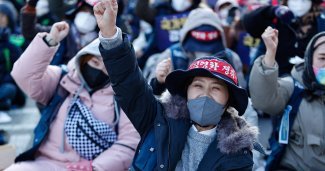

Olivier De Schutter & Luc Triangle: “Most poor people in the world work. The systematic attacks on unions significantly reduces the ability of working people to secure and defend decent wages. Wages are not a neat calculation based on supply and demand and the price of labour; they are born from a bargaining process.”
The unrelenting violations of trade union rights documented by the International Trade Union Confederation’s (ITUC) Global Rights Index over the past ten years have led to wages being kept pitifully low. To fix this injustice governments must respect existing trade union rights and, where necessary, strengthen them.
Most poor people in the world work, yet they do not earn enough to provide a decent standard of living for themselves or their dependents. Even before Covid-19, more than one in five workers lived in poverty (surviving on less than US$3.10 per day), with 8 per cent in extreme poverty (US$1.90 per day).
Unsurprisingly, one of the leading explanations for the rise of the working poor is low wages.
The global share of wealth that goes to wages has, in fact, been declining for years, with real wages stagnating even as employers have seen the productivity of their workers grow.
Soaring inflation has eaten further into workers’ already stagnating wages, income inequality is accelerating, and the global gender pay gap remains above 20 per cent. The first half of 2022 saw the first negative growth of global wages this century, with monthly wages falling in real terms by 0.9 per cent.
There will be no end to poverty while workers are receiving poverty wages.
Attacks on unions = low wages
A major reason why wages remain so low is the weakening of trade unions.
Basic workers’ right have been undermined worldwide for some time, and the ITUC Global Rights Index has detailed a decade of attacks and restrictions on the right of working people to organise unions to demand a fair share of economic prosperity.
In 2023, the Index showed that 77 per cent of countries denied workers the right to form and join a union, 73 per cent impeded union registration and 79 per cent violated the right to collective bargaining.
Legally, these are violations of international human rights law and International Labour Organization (ILO) conventions that require governments to guarantee the right of each worker to form and join trade unions and to protect them from intimidation and reprisals.
Practically, the systematic attacks on unions significantly reduces the ability of working people to secure and defend decent wages.
Wages are not a neat calculation based on supply and demand and the price of labour; they are born from a bargaining process. It is the role of unions to represent working people in this process. Weakened unions mean a weakened bargaining position for workers who are unable to win improved wages in negotiations.
In fact, studies have shown that union members earn more than workers who are not members by between 10 and 25 per cent. While in some unionised workplaces this wage premium can be lower, it will be because all the workers, including the non-union members, benefit from pay rates negotiated by unions.
The answer is union rights
Until governments uphold trade union rights actively, forcefully and publicly, some workers will refrain from organising out of fear of reprisals.
This chilling effect will continue to artificially suppress membership, further weakening the ability of unions to protect workers’ rights and secure just wages – which should be set at a level that either corresponds to the ‘living wage’, allowing the worker and their family an adequate standard of living, or at least 60 per cent of the median wage in the country, whichever is highest.
Key to this is the collective bargaining process. This allows workers unions and employers to reach fair agreements on wages, but this crucial practice is being stifled around the world.
In 2014, the ITUC Global Rights Index reported that 63 per cent of countries had violated this right; by 2023 that figure had risen to 79 per cent, with no countries in some regions of the world maintaining this basic right.
Governments must come out in defence of collective bargaining – a plea Olivier De Schutter will take to the United Nations General Assembly in New York this month where he will present his new report, The working poor: a human rights approach to wages.
Until governments safeguard this right and stop interfering by imposing excessive requirements on the process, the essential role of workers’ unions to negotiate pay rises will be seriously stifled, workers will continue to see their salaries suppressed and there will be no escape from poverty for a large proportion of the world’s workers.












